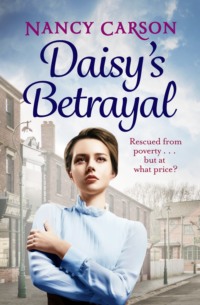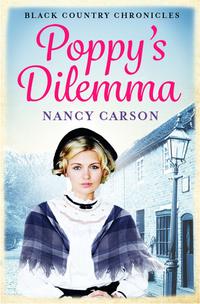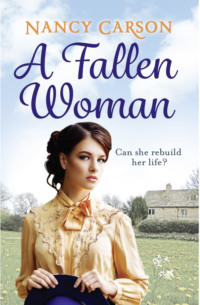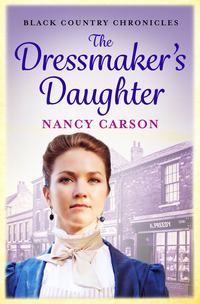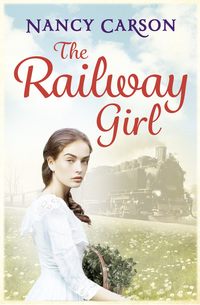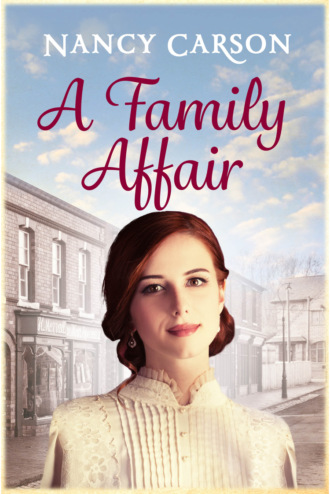
Полная версия
A Family Affair

A Family Affair
NANCY CARSON

A division of HarperCollinsPublishers
www.harpercollins.co.uk
AVON
HarperCollinsPublishers Ltd
1 London Bridge Street
London SE1 9GF
www.harpercollins.co.uk
First published in Great Britain by HarperCollinsPublishers 2015
Copyright © Nancy Carson 2015
Cover images © fourseasons /istock by Getty 2015
Nancy Carson asserts the moral right to be identified as the author of this work.
A catalogue record of this book is available from the British Library.
This novel is entirely a work of fiction. The names, characters and incidents portrayed in it are the work of the author’s imagination. Any resemblance to actual persons, living or dead, events or localities is entirely coincidental.
All rights reserved under International and Pan-American Copyright Conventions. By payment of the required fees, you have been granted the non-exclusive, non-transferable right to access and read the text of this e-book on screen. No part of this text may be reproduced, transmitted, down-loaded, decompiled, reverse engineered, or stored in or introduced into any information storage and retrieval system, in any form or by any means, whether electronic or mechanical, now known or hereinafter invented, without the express written permission of HarperCollins.
Ebook Edition © 2015 ISBN: 9780008134846
Version: 2017-11-14
Contents
Cover
Title Page
Copyright
Chapter 1
Chapter 2
Chapter 3
Chapter 4
Chapter 5
Chapter 6
Chapter 7
Chapter 8
Chapter 9
Chapter 10
Chapter 11
Chapter 12
Chapter 13
Chapter 14
Chapter 15
Chapter 16
Chapter 17
Chapter 18
Chapter 19
Chapter 20
Chapter 21
Chapter 22
Chapter 23
Chapter 24
Chapter 25
Chapter 26
Chapter 27
Chapter 28
Chapter 29
Chapter 30
Chapter 31
Chapter 32
Be swept away by THE BLACK COUNTRY CHRONICLES
About the Author
About the Publisher
Chapter 1
What she’d just been told shook Clover Beckitt rigid. How greatly it would change her life she did not know, but change her life it would; irredeemably. Maybe it would change it for the better – there was plenty of room for improvement – but maybe it would not. Time alone would tell. And that time would not be long coming, for the change was to commence one week from tomorrow. Preparation, however, was about to start right now. And with a vengeance.
‘Get your hat and coat on, our Clover,’ Mary Ann, her dour mother instructed. ‘I’m taking you to the dressmaker’s. Zillah has promised to look after the taproom till Job comes on.’
‘I’d better change into something clean, Mother, and wash my face and hands. I’ve just got in from work. I’m filthy dirty.’
‘Well make sure your underwear’s decent and all. I don’t want folk talking about me behind me back, saying as how me only daughter’s riffy.’
‘You’d be riffy as well if you had to work in a foundry making cores,’ Clover complained as she headed for the stairs. ‘Why can’t I have a nice clean job in a nice posh shop?’
‘Because the pay’s better in a foundry,’ Mary Ann called after her. ‘As you know well enough.’
In her spartan bedroom, Clover unfastened her home-made working frock and underslip, took off her headscarf and unpinned her dark hair. She placed a sheet of newspaper over the podged rug at the foot of her brass bed and vigorously brushed her hair over it to dislodge any bits of sand that sometimes penetrated to her scalp. Tiny grains of black sand rippled gently onto the newspaper, which she screwed into a ball to throw away in the miskin outside. She washed her face, her ears and neck, and then her feet in cold water which she poured from her ewer into the bowl that adorned the wash stand. Dried, and feeling immensely more presentable, she rummaged through her wardrobe for a clean dress, and in the drawers of her dressing table for a decent underslip, clean drawers and clean stockings. She loathed dirt, especially foundry dirt, and it was such luxury to change into clean clothes. When she was finished, wearing dainty shoes and all, she returned to the parlour.
‘I’m ready.’
‘I’ll just tell Zillah we’m off then. Wait outside for me, our Clover.’
Mary Ann, her hair tied back severely with a black ribbon, was wearing the long black coat she’d owned ever since Toby, Clover’s father, had died in 1892 – fifteen years ago. It was profoundly unfashionable, but fashion was a luxury they could not afford. The coat, however, was not the only Victorian thing about Mary Ann. The stern, unsmiling, tight-lipped demeanour prevailed, as did the total rejection of anything that was not orthodox or had not been entirely sanctioned by the Good Book. For Mary Ann was also a devout Christian. However, as a licensed victualler, her loyalties were often divided, especially when the intolerant aims and ideals of the Band of Hope were thrust in her equally intolerant face, as they so often were.
Still reeling with consternation from the news her mother had imparted, Clover walked outside into George Street and stood with her back to the Jolly Collier, the public house her mother owned and ran. It was a red-brick affair, dingy on the outside from the smuts of heavy industry and intensive coal mining. The roof was missing one or two slates and the window-frames were shedding their dull green paint in brittle, curling flakes. Inside, the curtains reeked of cigarette smoke and stale ash and even the wallpaper on the upstairs landing was yellowing with nicotine stains from the thick smoke that drifted upstairs from the taproom. The stale smell of beer was pervasive. But it was home.
As Clover turned her face to the slanting sun to consider once again this monumental change that was facing them both, she heard the tap-tap of her mother’s footsteps on the quarry-tiled floor of the inside passage. She turned, ready to go. They walked briskly up George Street and turned the corner into Brown Street. Clover had a thousand questions she needed to ask her mother, but there was no time now. They arrived at the door of Bessie Roberts and entered her front parlour, which had been converted into a shop-cum-sewing room many years earlier. Inside was a stout woman with grey hair and spectacles.
‘Mrs Beckitt, how lovely to see you again,’ Bessie Roberts greeted obsequiously in her thin voice that was incongruous with her size. ‘How long’s it been?’
‘A year or two, Mrs Roberts, by anybody’s reckoning. Our Clover here wants a new frock. Suitable for a wedding.’
Bessie looked Clover up and down with a well-practised look of admiration. ‘Oh, a wedding dress, eh?’ She smiled professionally. ‘Very nice. Oh, she’ll make a lovely bride and no mistake. I reckon I’ve got the very thing.’
‘It’s me that’s getting married, Mrs Roberts, not our Clover,’ Mary Ann pronounced self-righteously. ‘And I know what I’m gunna be wearing. Like I said, it’s me daughter as wants the frock.’
‘Forgive me, forgive me, Mrs Beckitt. I naturally thought…Well, fancy…that’s nice as you’m getting wed again. Let me congratulate you. Shall you be staying on at the Jolly Collier?’
‘Oh, yes, we shan’t be going nowhere. So what have you got in the way of material, Mrs Roberts? Something blue or green, I fancy.’
‘Oh, blue to match your daughter’s eyes,’ Bessie Roberts affirmed. ‘I reckon I’ve got the very thing.’ She hunted beneath her counter and flopped a roll of azure-blue satin material on top. ‘This is beautiful stuff, Mrs Beckitt. Just feel…And the colour would contrast beautifully with her lovely dark hair…Don’t you think?’
‘Have you got e’er a pattern what I can look at? The fashion seems more for fitted bodices and skirts these days from what I can see of it.’
‘I’ve got the very thing, Mrs Beckitt.’ She hunted again in a cardboard box. ‘When is the happy day, Mrs Beckitt?’
‘A week on Saturday.’
‘Good Lord! So soon?’
‘Yes, we’ll all have to get our skates on, I’m a-thinking. I take it as read that you can accommodate we, Mrs Roberts?’
‘It’ll be a bit of a rush but, yes. Ah…Here we are…’
Mrs Roberts placed the printed sketch of the dress on top of the roll of material.
‘I like it,’ Clover said, taking the first available opportunity to get a word in. ‘I think it’s perfect.’ She looked at Mary Ann for consent. Mary Ann nodded and, without further ado, the decision was made.
‘I’d better take some measurements, young Clover. Would you like to slip into the back room with me and take your dress off? I like to take an accurate measurement.’
The three women trooped into the tiny back room. Clover took off her dress and stood in her clean underwear while Bessie Roberts produced her measuring-tape from her apron pocket.
‘Such a lovely figure you’ve got, Clover,’ Bessie commented. ‘Doesn’t she, Mrs Beckitt? It takes me back to when I was as slender…Just lift your arms a little bit, please…That’s it. Now your waist…I see you don’t wear a corset, Clover.’
Clover thought she detected disapproval in Bessie’s tone. ‘I don’t need to, Mrs Roberts.’
‘It’s one thing we can never agree on, Mrs Roberts,’ Mary Ann complained. ‘I’m a firm believer that all women should wear a corset.’
Clover smiled secretly as she alone caught the unintended humour in her mother’s words.
‘Oh, as you say, Mrs Beckitt, but your daughter’s very trim.’ She gently prodded Clover’s belly. ‘Just look…I wish my belly was as flat…Can you hold the end of the tape for me, Clover?…At your waist…while I get the length?…That’s lovely.’
It was half an hour later when they left. Mary Ann had paid a deposit on the dress which would be ready on Good Friday, provided Clover could come for a fitting about the same time next Wednesday.
When they returned to the Jolly Collier Mary Ann placed two plated dinners in the oven to be reheated. The meal had been cooked earlier by Zillah Bache.
‘Are you marrying for love, Mother, or convenience?’ Clover asked pointedly as she sat down in front of the coal fire. The question had been troubling her.
Mary Ann shut the oven door of the cast-iron grate using a rag and stood upright. ‘Do I seem the sentimental sort, our Clover?’
‘That’ll be the day.’ Clover scrutinised her mother’s expression, looking in her eyes for a clue as to her true feelings. ‘I just wondered. It’s all so sudden. It’s such a shock.’
Mary Ann pulled a chair from under the scrubbed wooden table. She sat down opposite her daughter and sighed. ‘Ever since your father passed away fifteen years ago next November I’ve run this place on me own, pub and brewery. I’ve tried to bring you up to the best of me ability and all, but it ain’t bin easy. I had to take Zillah on to help in the house and look after you. But folk cost money to employ and money’s scarce, Clover. It’s always bin scarce.’
‘Our beer’s still as good as ever it was,’ Clover encouraged.
‘Because I know what I’m a-doing when I brew it and because it has to be, else we’d sell none. By this time last year though, our Clover, I’d had enough. I know I never said nothing to you but I was ready to pack it all in. I’d been working me fingers to the bone eighteen hours a day. And for what? What with a mortgage on this place to pay off, bills for malt and hops, for coal to heat the copper and the mash tun, the excise man to pay, as well as Zillah and Job Smith, that bone-idle cellarman. And God knows who else. It’s no wonder I insisted you went out to work. We’ve needed the money, Clover.’
‘And it’s not every girl’s dream, working in a foundry,’ Clover commented as one of the cats, Malcolm, came in and rubbed itself gently against her shins, a sensation she enjoyed.
‘Anyway, when I thought about it hard, our Clover, I had to admit to meself that the only way we could live in anything like comfort and peace of mind would be for me to marry, cause there’s no sign of you getting wed.’
Clover peered through the window onto the back yard and saw that it was raining. ‘Well, that’s not my fault. When have I ever been given the chance to do any courting?’ she said, throwing right back in her mother’s face the prejudice she instinctively held against any of Clover’s likely suitors. ‘You’ve never allowed me to go out with lads.’
‘It’s been for your own good,’ Mary Ann said soberly, picking her fingernails. ‘I never wanted you getting mixed up with any damned scruff. I always wanted you to wait till the right chap came along.’
Clover shrugged off the subject. Her mother knew her feelings well enough. ‘So did you ask Jake Tandy to marry you?’
‘Me ask him? As if I would.’ A hint of a smile teetered on the brink of Mary Ann’s eyes at that. ‘I didn’t have to, thank the Lord. He asked me. I’ve got to know him over the six months he’s been a regular here. He’s had a stall on Dudley Market and he ain’t short of a bob or two. He’ll have a house to sell as well. He wants to put money into the brewing, to expand that side of the business. He reckons we can sell our beer to free houses and off-licences. Not only that, he reckons them as owns the pits and the ironworks will buy barrels of the stuff off us. As he says, a hammer driver in a forge can sink twenty pints or more on a hot day. For every worker that amounts to a tidy lot of beer, our Clover.’
‘So tell me about Jake, Mother. I hardly know him.’
‘He’s younger than me – by four years…’
‘So he’s what? Thirty-eight?’
Mary Ann nodded, either ignoring or failing to recognise the trace of disapproval in Clover’s voice.
‘And he’s never been married?’
‘Oh, he’s been married afore, Clover. He’s a widower.’
‘A widower? Does he have children then? Children who are coming to live here?’
‘Just a daughter. Seventeen. Two years younger than you.’
‘Mmm…’ Clover mused. ‘Does she work?’
‘She’ll work here – serving, helping out in the brewery.’
‘While I have to work in a foundry.’
The main room of the Jolly Collier was the taproom, but it also boasted a snug with a fireplace where the women were more likely to congregate on Saturday and Sunday nights. The taproom was devoid of a bar counter; the beer pumps were built into a wooden construction that hugged one wall. So, when you wanted your glass refilled you hailed Mary Ann, or Clover, or Job Smith or whoever was serving, ordered your drink and they would deliver it to your table. A low, cast-iron fireplace framed a hearty coal fire at one end of the room, around which the older men huddled for warmth in winter.
Clover realised that running a busy public house and brewing sometimes in excess of thirty barrels of beer each week had indeed tended to keep Mary Ann at full stretch. But Clover did her bit to help despite her day job. By five each morning she would be up, lighting the fire in the taproom ready to receive the first ironworkers and miners when they called for their threepenny rum and coffee on their way to their morning shift. They would yawn and gossip like old biddies with their colleagues who also called in for a drink when returning home, tired from the night shift.
That evening, Jake Tandy turned up in the taproom with his younger brother, Elijah.
‘How am yer, my flower?’ he greeted.
Mary Ann smiled with pleasure at seeing him. ‘Rushed off me feet, as ever. But all the better for seeing you, Jacob,’ she replied. ‘Usual?’
Jake nodded. ‘And a pint of pale for our Elijah. Here, I’ve bought our Elijah to meet you, Mary Ann, seeing as how he’s gunna be me best man.’
Elijah stood erect and held out his hand formally. ‘I’ve been looking forward to meeting you, Mrs Beckitt. Jake’s said some fine things about you.’
‘Well, that’s just as well in the circumstances.’ Mary Ann replied. She turned to Jake. ‘And now is as good a time as any for you to meet our Clover properly. She’s always gone to bed by the time we’ve finished serving, so there’s never been a chance for her to get to know you.’
So Mary Ann issued them with a pint of beer each and led them into the living quarters, leaving Job Smith, the part-time bartender, to serve the customers.
‘How do you do, Clover,’ Jake said agreeably when he saw her.
Clover smiled back and blushed. ‘Nice to see you again, Mr Tandy.’
‘Hey, Mister Tandy, eh? Now that’s summat as’ll have to change. It’ll be no good calling me Mr Tandy when me and your mother am wed. Why not call me Pop and start right off? Sounds better than papa, I always reckon.’
Clover continued to smile politely.
‘I bet you’m wondering what sort of a chap I am, eh, Clover?’
‘I’m bound to wonder, Mr Tandy. I hope we can all live together contentedly.’
Clover had been aware of Jake Tandy for months, serving him pints of bitter in the taproom of the Jolly Collier. He had started loitering after closing time, collecting glasses, washing up, sweeping up the old sawdust and putting the spittoons out to wash – generally currying favour, by which time Clover had usually gone to bed ready for her early start next day. It galled her that she had not known he was to be her stepfather till today. Even though the banns must have been read, nobody had thought to mention the fact to her. Typical. Still, Clover couldn’t help wondering what Jake saw in Mary Ann and her stone-faced demeanour.
‘I’ve got a daughter meself, you know,’ he said and took a swig from his glass.
‘Mother said.’
‘Ramona. You’ll like her. There ain’t that much difference in your ages.’
‘I’m sure it’ll be very nice having a stepsister,’ Clover said equably. ‘Especially if she’s of an age.’
‘Well, she’s a nice lass, though I say so meself…And this is me brother, Elijah…’ Jacob turned to him. Clover shook his hand and said hello. She guessed him to be in his early thirties. He was smart, with dark hair, engaging brown eyes and a confident smile. ‘He’s going to be me best man at the wedding, Clover. I hope you’ve got a nice new frock to wear for it. Has your mother treated you?’
‘We’ve been today to order it, Mr Tandy. I’m sure it’ll be very suitable.’
‘It’s costing enough,’ Mary Ann commented typically. ‘But the wench has got nothing else.’
‘I bought one for our Ramona,’ Jake said. ‘Cost me a fortune, it did. But what’s money? Why worry about it?’
‘It’s only them as ain’t got money what worry about it,’ Mary Ann remarked. ‘And you know how we’ve been fixed, Jacob.’
‘And all that’s coming to an end, Mary Ann,’ Jake declared with a grin. ‘All that’s coming to an end.’
Good Friday in 1907, as well as being a holiday, was a perfect day for flying. A light south-westerly breeze was panting warmly as it ran up the side of Rough Hill, where Ned Brisco sat apprehensively in a weird contraption he had built, hoping it would fly. His older brother, Amos, sat crouched beneath the fragile wings on its port side waiting for Ned’s signal.
Ned gazed into the distance. Distance was his challenge. From these heights he overlooked the Clent Hills to the south, lush and green in their spring finery. In the far distance he could discern Worcestershire’s Malvern Hills, colourless on the hazy south-western horizon. Towards the north-west, beyond the furnaces of Ironbridge and Coalbrookdale, the Wrekin lay like a stone pushing up through Shropshire’s greenery. Ned imagined himself flying effortlessly in his machine over the vast expanse of gently undulating terrain that lay between himself and these yet unvisited outposts. Once beautiful countryside, it was now pockmarked by scores of pit-heads and slag heaps and quarries, and by chimney-stacks that spewed endless palls of filthy smoke into the hazy, white sky that was struggling to turn blue in the spring sunshine. As well as these effigies to the industry and enterprise of man, the inevitable stone structures loomed that were erected to the greater glory of God. The spire of Top Church in the middle distance to the north-west pierced the atmosphere like a tintack, while St John’s and its square grey tower occupied a ledge on Kates Hill to the north. Beyond St John’s stood Dudley Castle, hoary, crumbling, derelict, yet defiantly majestic.
The girl with him looked striking, despite being plainly dressed in a home-made blouse and skirt. Her eyes were intelligent, as blue as summer cornflowers. Her skin was fair yet her lush hair was as dark and shiny as the coal they mined thereabouts. When she smiled her face lit up and you couldn’t help but smile with her, for she seemed then to throw off the shackles of reserve and shyness that normally confined her. Clover Beckitt was Ned’s soul mate.
As well as Clover and his brother Amos, both of whom gave Ned much needed encouragement, a smattering of ragged children had attached themselves to the band and their cart. They looked on in incredulous silence and wonder, hoping they would witness the miracle of man and machine in flight.
‘All right, Amos,’ Ned called. ‘Let her go.’
Amos quickly pulled a chunk of wood from under one of the thin, spoked bicycle wheels on which the contraption stood. The ensemble began to roll downhill over the stubbly grass that cloaked that side of Rough Hill between two disused quarries, gathering speed quickly. Ned held his breath as his stomach seemed to rise into his mouth.
‘Be careful, Ned!’ Clover called, hearing the creak of struts and wire and stretched canvas. ‘Don’t crash into the pepper-box.’
‘Let’s hope he gets that bloody far,’ Amos said dubiously, seeing that the Dudley Tunnel’s air shaft of which Clover spoke was directly in Ned’s path, but unreachable. ‘If he ended up in Warren’s Hall pond, even that would be summat to crow about.’
Clover chuckled at the mental image Amos’s words conjured, then remained silent for seconds that seemed like ages while they watched Ned’s progress. The contraption had reached about thirty miles an hour and was almost at the place where the steep hill was levelling out when Clover whooped with excitement.
‘Look, Amos, look! He’s flying! He’s flying!’ She turned round to catch Amos’s reaction, a delighted grin on her lovely face. Behind them, the group of ragamuffins cheered boisterously.
‘By Christ, he is and all…He’s airborne, Clover…Whoops!…Oh, Jesus Christ…Well, he was airborne.’
She saw the contraption stall and hit the ground. At once she hitched up her long cotton skirt and ran for all she was worth down the hill in her buttoned-up boots, her dark hair flowing like a mane behind her.


